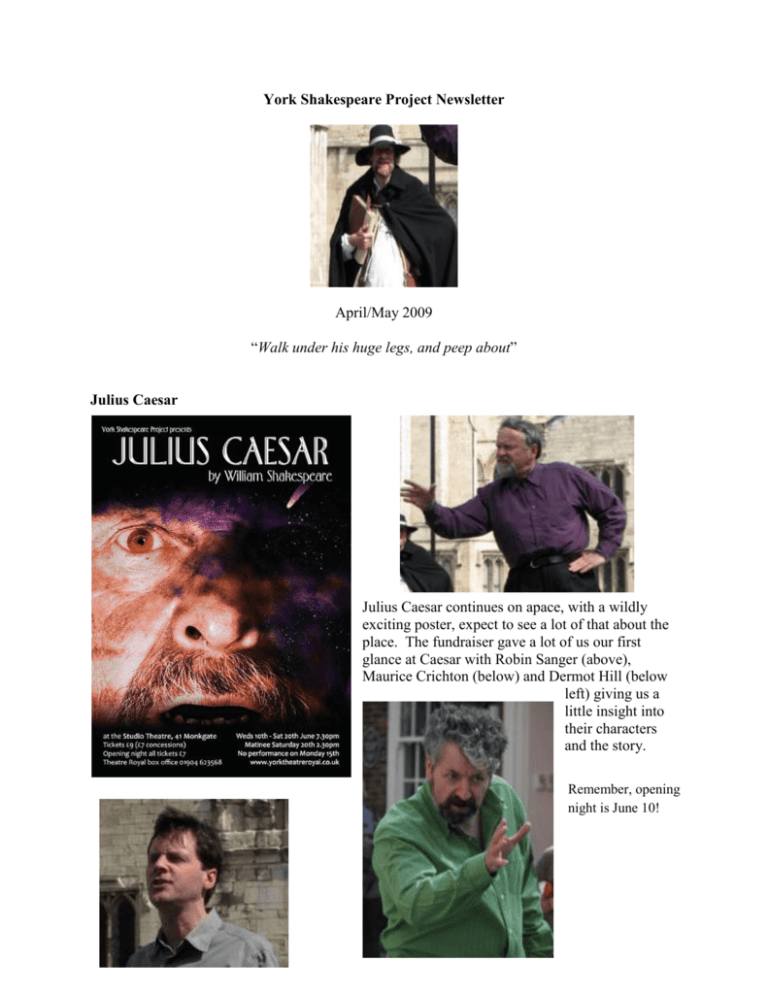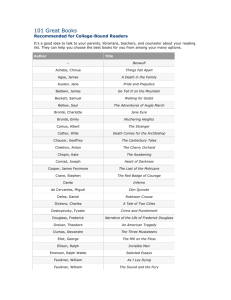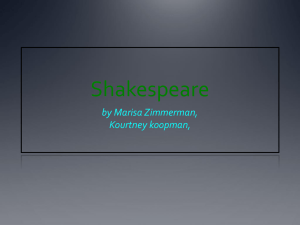April/May 2009 - York Shakespeare Project
advertisement

York Shakespeare Project Newsletter April/May 2009 “Walk under his huge legs, and peep about” Julius Caesar Julius Caesar continues on apace, with a wildly exciting poster, expect to see a lot of that about the place. The fundraiser gave a lot of us our first glance at Caesar with Robin Sanger (above), Maurice Crichton (below) and Dermot Hill (below left) giving us a little insight into their characters and the story. Remember, opening night is June 10! Spring Fundraiser Enormous great big thanks to all of you who took part in the Fundraiser on 25 April in town. For a first time event it was excellent, and we would hope to do it again and again in future. What’s more the aftermath in the Guy Fawkes and then the White Swan proved that there was still a hearty appetite for Big Nights Out. Who would have thought such a small drink could have caused such carnage?? The tragedy of Romeo and Juliet Juliet – I will survive Lovely witches Richard Burbage Rude mechanicals Taming of the Shrew Our friends at Mooted (A Life in the Theatre, ‘Tis Pity She’s a Whore) are producing Taming of the Shrew for their summer spectacular, which is being performed in Rowntree Park in York on 1 – 10 July and Valley Gardens in Harrogate on 14 - 17 July. It stars Jonathan Bedford (King John, Henry VI), Andy Curry (Henry VI), Alistair Carr (newsletter fellow) and Lara Pattison (As You Like It and Songstress from the Heavens), and is directed by Mark France (A Midsummer Night’s Dream, Henry VI). Further information can be found at their website at http://www.mootedtheatre.com/, and what’s more, and this is wildly exciting, if you book your ticket through their website before 10 May, you get £2.00 off each ticket!!! I know!!! Me too!!! Henry VIII, from Jeremy Muldowney As I'm sure you are all aware, this year is the 500th anniversary of the accession of Henry VIII (love him or loathe him!). To mark this momentous event, the British Library is mounting a major exhibition of Henrican MSS etc in London; with a selection of facsimiles on display (in conjunction with locally held artifacts) at various "out-stations" around the country. The Minster is to be one such location. The exhibition itself will run for three weeks in July, but we are going to have a "Henry VIII Extravaganza" on Saturday July 18th, and it has been has agreed that YSP can produce a 20 minute abridged version of Shakespeare's rarely performed play about Henry at intervals through the day; probably twice in the morning and twice in the afternoon. It's not certain yet whether this will be inside the Minster or in Dean's Park; but it would work equally well either way. Julia Atkinson has already produced an edited script and I am working on production matters. I envisage a "Cheek by Jowl" - type setting with all cast on view throughout; minimalist costume perhaps black with one striking item or prop for each character for purposes of identification (crown; hat; cloak; sword; psalter etc). I need at least six speaking parts, plus a flexible quantity of non-speaking courtiers/spear carriers etc. That's about it, basically! If you would like to be involved, please contact me asap on 01904 421588 /01904 557224/ 0754 3636101/j.e.muldowney@dsl.pipex.com/jeremym@yorkminster.org. This is a tremendous opportunity to raise our profile both nationally and perhaps even internationally. We already have the Minster's publicity machine behind us and, of course, the British Library is without doubt the foremost institution of its kind on the planet. So let's not just "re-enact" theatrical history ... let's make it! “He’s not the Bard, he’s a very naughty boy”: a famous forger and his links with York by J D Atkinson In the summer of 1811, an inmate of the debtor’s prison at York Castle felt the urge to express himself in verse whilst confined within “...The walls of York Castle, the county’s fine jail, Where Debtors, poor devils, their sad durance wail. Say, wilt thou, blest mercy, thine arm e’er extend, And prove of these suff’rers the saviour and friend? O! Wilt thou imprisonment’s shackles withdraw, And soften the debtor’s and creditor’s law?” It wasn’t the financially embarrassed prisoner’s first foray into literature. Before his extravagant ways caught up with him he had edited a weekly York paper called “The Comet” and was briefly the editor of the “York Herald”. He was the author of several historical novels and collections of poetry. But his chief claim to fame was a truly remarkable one – seventeen years earlier, at the tender age of nineteen, William-Henry Ireland had nearly pulled off the most audacious literary hoax in history. William-Henry was born in London in either 1775 or 1777, depending on which version of his life story you choose to believe. His father was Samuel Ireland, an engraver and amateur historian, and his mother may have been Samuel’s mistress/housekeeper Mrs Freeman. Both Samuel and Mrs Freeman refused to tell William-Henry the truth about his origins, and to add insult to injury Samuel made no secret of the fact that he regarded his son as a dunce who would never amount to anything. But William-Henry eventually hit upon a way to impress his father, a man whose worship of Shakespeare knew no bounds. Despite having little knowledge of the spelling, grammar and handwriting of the late sixteenth and early seventeenth centuries, William-Henry embarked on a brief but spectacular career as a forger of all things Shakespearean. Using blank sheets of paper cut out of old books and homemade ink that looked convincingly ancient when the finished manuscript was held close to a flame, the teenager produced a series of increasingly bizarre documents from the hand of William Shakespeare. He started small with Shakespeare’s signature on a mortgage deed, which he presented to his father in December 1794. Samuel was suitably impressed, and William-Henry explained that he had discovered it amongst manuscripts owned by a mysterious “Mr H” who had allowed him access to these documents and given him permission to make them public. The signature was followed by a series of letters to and from Shakespeare, a poem by Anne Hathaway, a ring containing a lock of Shakespeare’s hair and a miniature portrait of the Bard in the role of Antonio in “The Merchant of Venice”. The letters were particularly absurd, written in a weird pseudo-Elizabethan English of William-Henry’s own devising (“thou arte as a talle Cedarre stretchynge forthe its branches and succouring smaller Plants fromme nyppynge Winneterre”). Historical howlers abounded, such as a reference to the Globe Theatre ten years before it was built. Yet so few genuine documents in Shakespeare’s hand were known at the time that many people who should have known better were eager to believe. Such was the rapturous reception granted to his early efforts that William-Henry was inspired to produce his most daring invention – “The Tragedy of Vortigern and Rowena”, a previously unknown play by Shakespeare! Richard Brinsley Sheridan had initially been a firm believer in the authenticity of William- Henry’s Shakespearean treasures, and he had been keen to produce “Vortigern and Rowena” at Drury Lane with a distinguished cast including John Philip Kemble and his sister Sarah Siddons. But as the first night approached he began to have doubts, doubts which may have been shared by Mrs Siddons as she withdrew from the production at the last minute. Then, only two days before the play opened, the great scholar Edmond Malone published a devastating exposé of WilliamHenry’s Shakespeare forgeries. The only course left to Sheridan was to encourage his actors to play “Vortigern and Rowena” for laughs, which they promptly did. The performance was a fiasco and the play opened and closed on 2nd April 1796. Even after William-Henry confessed to his father that he had indeed forged the Shakespeare papers Samuel refused to believe him. Samuel himself had been implicated in the fraud and to this day there are those who feel that he may have known much more about his son’s activities than he admitted to. However, shortly before he died in July 1800 Samuel made a will in which he forgave his son and left him a small amount of money and his repeating watch. William-Henry wasn’t content to sink into obscurity after being exposed as a forger. He married twice, spent some time in France with his second wife but was obliged to return to England when he found himself in financial difficulties. After being released from the debtor’s prison at York Castle he returned to France, where he and his family witnessed Napoleon’s return from exile in 1815. The Emperor later nominated William-Henry for the Legion d’Honneur, and the ex-forger’s acceptance of this did nothing to improve his reputation in England. WilliamHenry remained a compulsive writer, whose sixty books included a four-volume biography of Napoleon and a more modest volume about the actress Dorothy Jordan (which her former lover King William IV paid him not to publish). William-Henry died in London in 1835 at the age of 59. He had never expressed the slightest guilt about his forgeries, and late in life boasted about his skill in fooling so many experts: “I was a boy – consequently they were deceived by a boy; and the imposition practised on their intellectual faculties was therefore the more galling.” Nobody wants this to turn nasty… But 23 April has been and gone which means that subs are due for another year. But remember what a bargain they are, and what fun you get to have, you can be in Shakespeare’s plays, you can take part in fundraising, you get this frankly magnificent newsletter sometimes and occasionally we’ll have great big regrettable nights out at the pub. Sally knows who you are, where you are, whether you’ve been nice or naughty this year and all such matters of import, so the easiest thing to do is arrange to see her, or get her address and hand over the loot (in cash or cheque) otherwise we’ll send the Caliban Brothers round. Press release from York St John University Film and TV Production department is searching for actors. York is one of the most filmic cities in the UK, yet no major production, film or TV, has ever featured the city. The university is taking the first steps towards changing that. By building a database of available actors and extras, it will begin the process of making the city a more attractive location for film makers. Over the weekends of 2 & 3 and 9 &10 May the university will be staging screen tests for local actors interested in appearing in films. More than 100 films a year are made at the university and it is always looking for actors. The university intends to make the database of actors available to commercial film and TV companies wanting to film in and around York. The screen tests will take a maximum of 30 minutes per person and all are welcome. At this stage, only adults can be screen tested, though it is hoped to run sessions for local children in the near future. The sessions will be friendly and informal and all participants will receive a DVD of their screen test. The footage and contact details will be transferred to a digital database which can be accessed by student and commercial film makers. Further screen tests will be held in the autumn and future initiatives will include a location search, identifying individuals and businesses willing to let their property be used by film makers. Eventually it’s hoped that the York film database will become a one stop shop for film makers, allowing them to access all their requirements through one internet gateway. Head of Programme Rob Edgar Hunt said, ‘Many people have commented on York’s need for a signature film or TV production. We, too, think it would be excellent news for the city but we know it’s not going to happen by magic. These screen tests are just the first stage in helping make it happen’. The screen tests will be conducted on an appointment basis and anyone interested in taking part should email James Richards at the University of York St John. The email address is j.richards1@yorksj.ac.uk. Anyone without email access should ring on 07840 796788. For further information please contact Michael White in the Press Office on 01904 876503 m.white@yorksj.ac.uk or go to www.yorksj.ac.uk Upon the sand, upon the bay Blimey, that went on a bit didn’t it? Please get in touch if you want to submit something for publication as you can see people have done here. Why not join them? It makes me happy, which is Important. Or perhaps you want to say the newsletter’s too long, or too short, or just the right length? Or suggest a regrettable Big Night Out?? For all the above, and, indeed anything else, please email me at mr.alistair@talk21.com. Farewell miftris, nothing elfe!






